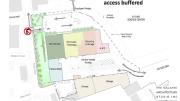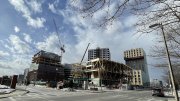The Boston Redevelopment Authority (BRA) voted unanimously on Thursday night to allow the University to move its campus services facilities to 28 Travis Street in North Allston in order to make way for planned development on the existing site, at the corner of Western Avenue and North Harvard Street. The Travis Street facility (which will include campus police training, information technology, recycling, furniture storage, and fleet management) will likely become Harvard’s first completed project in Allston since the University announced plans to resume construction there last year.
The plan to relocate campus services (especially the vehicular component)—the target of much criticism from local residents who felt the project’s location was a poor fit with the surrounding neighborhood—was backed by local unions and by Harvard Allston Task Force members and city officials only after the University agreed to conditions outlined by Mayor Thomas Menino. (He had met with residents during the past few weeks to discuss their concerns.)
The campus-services move, University officials said on Thursday, would be temporary. In addition, Harvard has committed to:
- begin a community-planning process this April to build Rena Park, a community open space (to be located next to the Travis Street facility) on which construction will commence in 2014;
- draft a master plan for campus services and finalize those plans within one year of completing the University’s planned Science Complex, on which construction is slated to begin next year;
- adhere to a ban on deliveries between midnight and 6 a.m. at the 28 Travis Street site, and to prevent traffic from coming in and out of Travis Street directing it to Western Avenue;
- provide Allston and North Brighton residents with access to the Harvard shuttle buses that run to Harvard Square.
Associate vice president for public affairs and communications Kevin Casey also noted that a new, landscaped courtyard in front of the new Campus Services facility will provide an almost football-field-sized buffer between the Harvard site and the nearest neighborhood structure. “We will engage with the BRA in a planning process for all support services within our master plan,” Casey said during the hearing. “It won’t be an afterthought. We won’t be coming back and saying, ‘Gee, we approved this building and we forgot there are a bunch of support services we want to locate here.’”
Casey also announced the University’s commitment to provide $500,000 in support for new programs for local charity organizations during the next five years.
Several union members and city officials spoke in support of the move, including state representative Michael Moran, who represents residents who have been critical of the University’s plan for 28 Travis Street in the past. “In the eight years we’ve been doing this, all we’ve seen is a hole….And now the first thing we see is a garage with a fleet of trucks they want to move closer to the community,” Moran said. But, he added, “It’s also necessary to understand that this move will spur a whole bunch of other development that will be extremely positive and good for the community.”
The relocation to 28 Travis Street will make room for the University’s planned redevelopment of Barry’s Corner, a mixed-use, residential-and-retail complex on a 2.67-acre parcel of land at the North Harvard Street-Western Avenue intersection, just south of Harvard Business School. This project is contingent on BRA approval next month.









